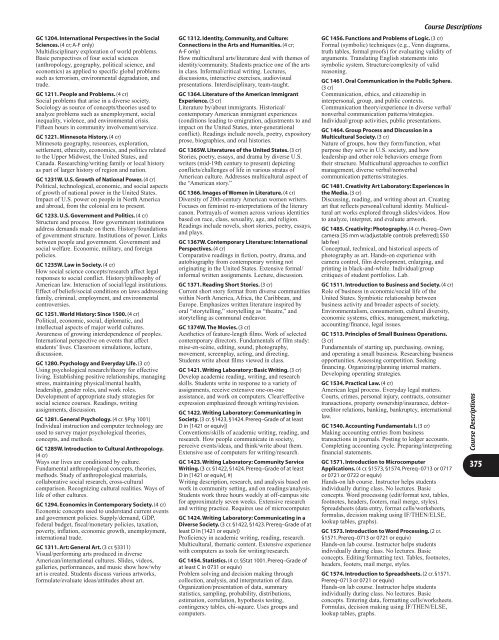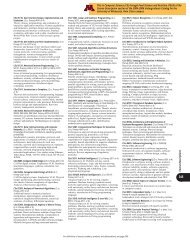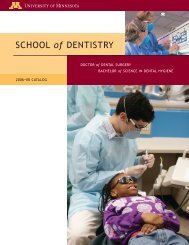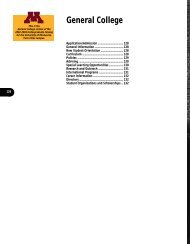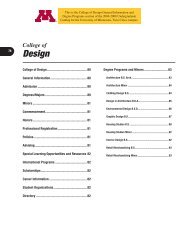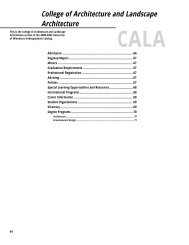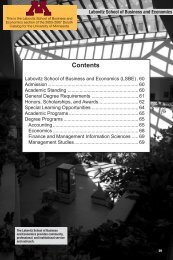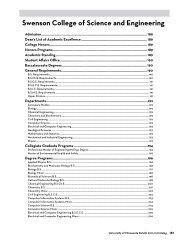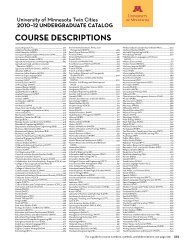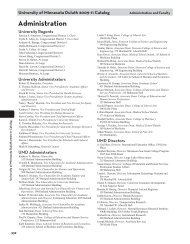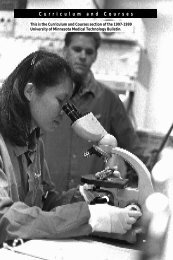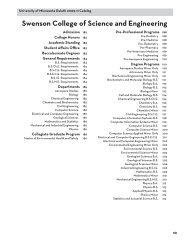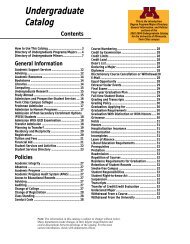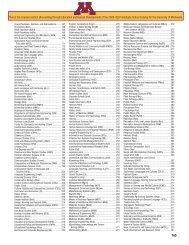CoursesâA through G and course numbers and symbols key
CoursesâA through G and course numbers and symbols key
CoursesâA through G and course numbers and symbols key
- No tags were found...
You also want an ePaper? Increase the reach of your titles
YUMPU automatically turns print PDFs into web optimized ePapers that Google loves.
GC 1204. International Perspectives in the SocialSciences. (4 cr; A-F only)Multidisciplinary exploration of world problems.Basic perspectives of four social sciences(anthropology, geography, political science, <strong>and</strong>economics) as applied to specific global problemssuch as terrorism, environmental degradation, <strong>and</strong>trade.GC 1211. People <strong>and</strong> Problems. (4 cr)Social problems that arise in a diverse society.Sociology as source of concepts/theories used toanalyze problems such as unemployment, socialinequality, violence, <strong>and</strong> environmental crisis.Fifteen hours in community involvement/service.GC 1221. Minnesota History. (4 cr)Minnesota geography, resources, exploration,settlement, ethnicity, economics, <strong>and</strong> politics relatedto the Upper Midwest, the United States, <strong>and</strong>Canada. Researching/writing family or local historyas part of larger history of region <strong>and</strong> nation.GC 1231W. U.S. Growth of National Power. (4 cr)Political, technological, economic, <strong>and</strong> social aspectsof growth of national power in the United States.Impact of U.S. power on people in North America<strong>and</strong> abroad, from the colonial era to present.GC 1233. U.S. Government <strong>and</strong> Politics. (4 cr)Structure <strong>and</strong> process. How government institutionsaddress dem<strong>and</strong>s made on them. History/foundationsof government structure. Institutions of power. Linksbetween people <strong>and</strong> government. Government <strong>and</strong>social welfare. Economic, military, <strong>and</strong> foreignpolicies.GC 1235W. Law in Society. (4 cr)How social science concepts/research affect legalresponses to social conflict. History/philosophy ofAmerican law. Interaction of social/legal institutions.Effect of beliefs/social conditions on laws addressingfamily, criminal, employment, <strong>and</strong> environmentalcontroversies.GC 1251. World History: Since 1500. (4 cr)Political, economic, social, diplomatic, <strong>and</strong>intellectual aspects of major world cultures.Awareness of growing interdependence of peoples.International perspective on events that affectstudents’ lives. Classroom simulations, lecture,discussion.GC 1280. Psychology <strong>and</strong> Everyday Life. (3 cr)Using psychological research/theory for effectiveliving. Establishing positive relationships, managingstress, maintaining physical/mental health,leadership, gender roles, <strong>and</strong> work roles.Development of appropriate study strategies forsocial science <strong>course</strong>s. Readings, writingassignments, discussion.GC 1281. General Psychology. (4 cr. §Psy 1001)Individual instruction <strong>and</strong> computer technology areused to survey major psychological theories,concepts, <strong>and</strong> methods.GC 1285W. Introduction to Cultural Anthropology.(4 cr)Ways our lives are conditioned by culture.Fundamental anthropological concepts, theories,methods. Study of anthropological materials,collaborative social research, cross-culturalcomparison. Recognizing cultural realities. Ways oflife of other cultures.GC 1294. Economics in Contemporary Society. (4 cr)Economic concepts used to underst<strong>and</strong> current events<strong>and</strong> government policies. Supply/dem<strong>and</strong>, GDP,federal budget, fiscal/monetary policies, taxation,poverty, inflation, economic growth, unemployment,international trade.GC 1311. Art: General Art. (3 cr. §3311)Visual/performing arts produced in diverseAmerican/international cultures. Slides, videos,galleries, performances, <strong>and</strong> music show how/whyart is created. Students discuss various artworks,formulate/evaluate ideas/attitudes about art.GC 1312. Identity, Community, <strong>and</strong> Culture:Connections in the Arts <strong>and</strong> Humanities. (4 cr;A-F only)How multicultural arts/literature deal with themes ofidentity/community. Students practice one of the artsin class. Informal/critical writing. Lectures,discussions, interactive exercises, audiovisualpresentations. Interdisciplinary, team-taught.GC 1364. Literature of the American ImmigrantExperience. (3 cr)Literature by/about immigrants. Historical/contemporary American immigrant experiences(conditions leading to emigration, adjustments to <strong>and</strong>impact on the United States, inter-generationalconflict). Readings include novels, poetry, expositoryprose, biographies, <strong>and</strong> oral histories.GC 1365W. Literatures of the United States. (3 cr)Stories, poetry, essays, <strong>and</strong> drama by diverse U.S.writers (mid-19th century to present) depictingconflicts/challenges of life in various stratas ofAmerican culture. Addresses multicultural aspect ofthe “American story.”GC 1366. Images of Women in Literature. (4 cr)Diversity of 20th-century American women writers.Focuses on feminist re-interpretations of the literarycanon. Portrayals of women across various identitiesbased on race, class, sexuality, age, <strong>and</strong> religion.Readings include novels, short stories, poetry, essays,<strong>and</strong> plays.GC 1367W. Contemporary Literature: InternationalPerspectives. (4 cr)Comparative readings in fiction, poetry, drama, <strong>and</strong>autobiography from contemporary writing notoriginating in the United States. Extensive formal/informal written assignments. Lecture, discussion.GC 1371. Reading Short Stories. (3 cr)Current short story format from diverse communitieswithin North America, Africa, the Caribbean, <strong>and</strong>Europe. Emphasizes written literature inspired byoral “storytelling,” storytelling as “theatre,” <strong>and</strong>storytelling as communal endeavor.GC 1374W. The Movies. (3 cr)Aesthetics of feature-length films. Work of selectedcontemporary directors. Fundamentals of film study:mise-en-scène, editing, sound, photography,movement, screenplay, acting, <strong>and</strong> directing.Students write about films viewed in class.GC 1421. Writing Laboratory: Basic Writing. (3 cr)Develop academic reading, writing, <strong>and</strong> researchskills. Students write in response to a variety ofassignments, receive extensive one-on-oneassistance, <strong>and</strong> work on computers. Clear/effectiveexpression emphasized <strong>through</strong> writing/revision.GC 1422. Writing Laboratory: Communicating inSociety. (3 cr. §1423, §1424. Prereq–Grade of at leastD in [1421 or equiv])Conventions/skills of academic writing, reading, <strong>and</strong>research. How people communicate in society,perceive events/ideas, <strong>and</strong> think/write about them.Extensive use of computers for writing/research.GC 1423. Writing Laboratory: Community ServiceWriting. (3 cr. §1422, §1424. Prereq–Grade of at leastD in [1421 or equiv], #)Writing description, research, <strong>and</strong> analysis based onwork in community setting, <strong>and</strong> on readings/analysis.Students work three hours weekly at off-campus sitefor approximately seven weeks. Extensive research<strong>and</strong> writing practice. Requires use of microcomputer.GC 1424. Writing Laboratory: Communicating in aDiverse Society. (3 cr. §1422, §1423. Prereq–Grade of atleast D in [1421 or equiv])Proficiency in academic writing, reading, research.Multicultural, thematic content. Extensive experiencewith computers as tools for writing/research.GC 1454. Statistics. (4 cr. §Stat 1001. Prereq–Grade ofat least C in 0731 or equiv)Problem solving <strong>and</strong> decision making <strong>through</strong>collection, analysis, <strong>and</strong> interpretation of data.Organization/presentation of data, summarystatistics, sampling, probability, distributions,estimation, correlation, hypothesis testing,contingency tables, chi-square. Uses groups <strong>and</strong>computers.Course DescriptionsGC 1456. Functions <strong>and</strong> Problems of Logic. (3 cr)Formal (symbolic) techniques (e.g., Venn diagrams,truth tables, formal proofs) for evaluating validity ofarguments. Translating English statements intosymbolic system. Structure/complexity of validreasoning.GC 1461. Oral Communication in the Public Sphere.(3 cr)Communication, ethics, <strong>and</strong> citizenship ininterpersonal, group, <strong>and</strong> public contexts.Communication theory/experience in diverse verbal/nonverbal communication patterns/strategies.Individual/group activities, public presentations.GC 1464. Group Process <strong>and</strong> Discussion in aMulticultural Society. (3 cr)Nature of groups, how they form/function, whatpurpose they serve in U.S. society, <strong>and</strong> howleadership <strong>and</strong> other role behaviors emerge fromtheir structure. Multicultural approaches to conflictmanagement, diverse verbal/nonverbalcommunication patterns/strategies.GC 1481. Creativity Art Laboratory: Experiences inthe Media. (3 cr)Discussing, reading, <strong>and</strong> writing about art. Creatingart that reflects personal/cultural identity. Multiculturalart works explored <strong>through</strong> slides/videos. Howto analyze, interpret, <strong>and</strong> evaluate artwork.GC 1485. Creativity: Photography. (4 cr. Prereq–Owncamera [35 mm w/adjustable controls preferred]; $50lab fee)Conceptual, technical, <strong>and</strong> historical aspects ofphotography as art. H<strong>and</strong>s-on experience withcamera control, film development, enlarging, <strong>and</strong>printing in black-<strong>and</strong>-white. Individual/groupcritiques of student portfolios. Lab.GC 1511. Introduction to Business <strong>and</strong> Society. (4 cr)Role of business in economic/social life of theUnited States. Symbiotic relationship betweenbusiness activity <strong>and</strong> broader aspects of society.Environmentalism, consumerism, cultural diversity,economic systems, ethics, management, marketing,accounting/finance, legal issues.GC 1513. Principles of Small Business Operations.(3 cr)Fundamentals of starting up, purchasing, owning,<strong>and</strong> operating a small business. Researching businessopportunities. Assessing competition. Seekingfinancing. Organizing/planning internal matters.Developing operating strategies.GC 1534. Practical Law. (4 cr)American legal process. Everyday legal matters.Courts, crimes, personal injury, contracts, consumertransactions, property ownership/insurance, debtorcreditorrelations, banking, bankruptcy, internationallaw.GC 1540. Accounting Fundamentals I. (3 cr)Making accounting entries from businesstransactions in journals. Posting to ledger accounts.Completing accounting cycle. Preparing/interpretingfinancial statements.GC 1571. Introduction to MicrocomputerApplications. (4 cr. §1573, §1574. Prereq–0713 or 0717or 0721 or 0722 or equiv)H<strong>and</strong>s-on lab <strong>course</strong>. Instructor helps studentsindividually during class. No lectures. Basicconcepts. Word processing (edit/format text, tables,footnotes, headers, footers, mail merge, styles).Spreadsheets (data entry, format cells/worksheets,formulas, decision making using IF/THEN/ELSE,lookup tables, graphs).GC 1573. Introduction to Word Processing. (2 cr.§1571. Prereq–0713 or 0721 or equiv)H<strong>and</strong>s-on lab <strong>course</strong>. Instructor helps studentsindividually during class. No lectures. Basicconcepts. Editing/formatting text. Tables, footnotes,headers, footers, mail merge, styles.GC 1574. Introduction to Spreadsheets. (2 cr. §1571.Prereq–0713 or 0721 or equiv)H<strong>and</strong>s-on lab <strong>course</strong>. Instructor helps studentsindividually during class. No lectures. Basicconcepts. Entering data, formatting cells/worksheets.Formulas, decision making using IF/THEN/ELSE,lookup tables, graphs.Course Descriptions375


